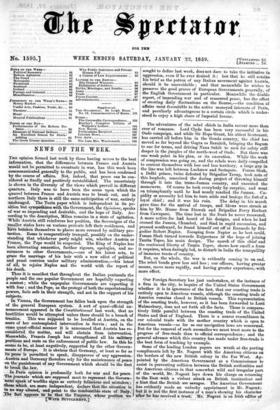The adventures of the rebel chiefs in India savour more
than ever of romance. Lord Clyde has been very successful in his Oude campaign, and while Sir Hope Grant, his ablest lieutenant, has carried all before him in the Gonda country, the chief has moved as far beyond the Gogra as Baraitch, bringing the Beg= to sue for terms, and driving Nana Sahib to seek for safety still deeper in the jungles of the north-west of Oude. But there was one weak point in his plan, or its execution. While the .work of compression was going on, and the rebels were daily compelled to content themselves with less and less territory, a large gap in the line was left between Lucknow and Seetapore. Feroze Shah, a Delhi prince, twice defeated by Brigadier Troup, took note of this loophole, conceived the daring project of throwing himself through it into the. trans-Jumna country, and executed the manceuvre. Of course he took everybody by surprise, and went on triumphantly until he had nearly reached the Jurena. Cu- pidity or necessity led him to turn aside and besiege the fort of a
loyal chief ; and it was his ruin. The delay in his march gave time for the arrival of troops, and blows were struck at him by Mr. Hume from Etawah and Brigadier Percy Herbert from Cawnpore. The time lost in the Doab he never recovered. A more active foe had heard of his designs, and when he had crossed the Jumna, Chumbul, and Sind. in rapid succession, and pressed southward, he found himself out off at Runnode by Bri- gadier Robert Napier. Escaping from Napier as he best could, Feroze Shah turned towards Rajpootana in the hope of joining Tantia Topee, his main design. The march of this chief and the continued liberty of Tanga Topee shows how small,a force it requires, when daringly led, to disturb in India the tranquillity of immense tracts of country.
But, on the whole, the war is evidently coming to an end. The rebel bands grow less and less ; our officers, having greater means, move more rapidly, and having greater experience, with more effect.






























